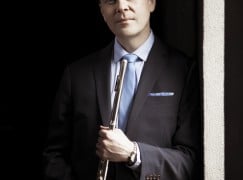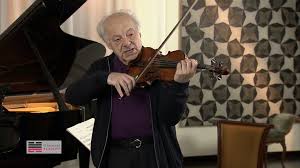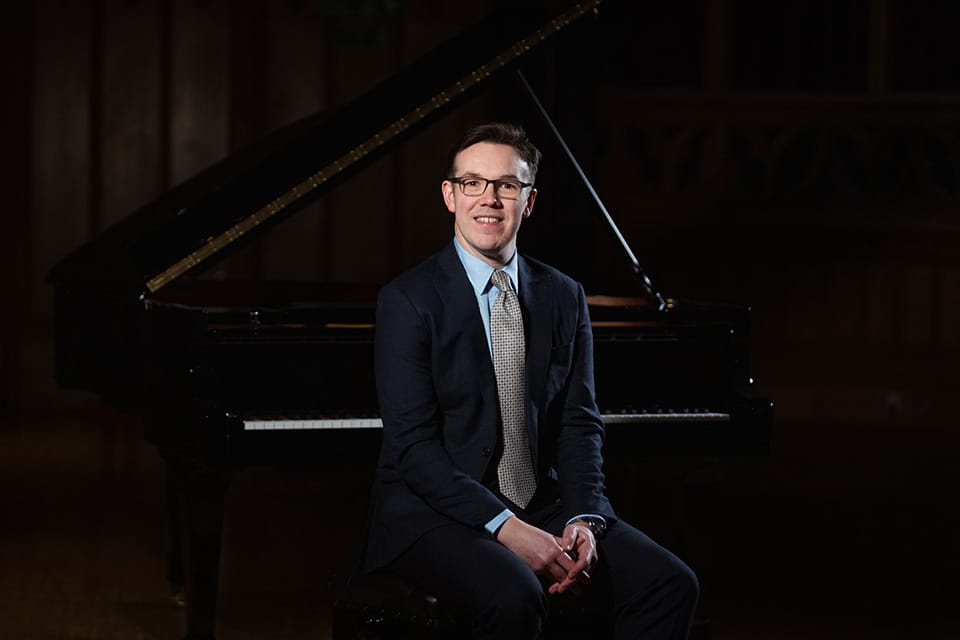Double-blow for Met: Both principal flutes resign in one day
mainWe reported earlier, in a Slipped Disc exclusive, that Ukraine-born Denis Bouriakov, 33, principal flute of the Metropolitan Opera orchestra, has accepted the same post at the Los Angeles Philharmonic.
We now understand that the Met’s other principal flute, Stefán Ragnar Höskuldsson, has won the vacant principal seat in the Chicago Symphony Orchestra.

To lose one principal flute is unfortunate. To lose both smacks of something rotten going on at the Met.
We hear that several younger members of the orchestra are auditioning elsewhere this summer.
There is a feeling that Peter Gelb does not care much for anything that is not seen on stage. He was overheard saying, ‘the orchestra doesn’t have to always sound that great’. Musicians are drawing their own conclusions. They are voting with their feet.





Though not fully consistent, I think there’s a general principle that pit players often want to move to symphonic orchestras. Among the reasons, there’s more visibility and status, more variation in the literature and work, and the hours are shorter. When the Met loses players, it might be a sign of its success. It has drawn players that can jump to LA or Chicago. Anyway, this is all relative in the world of the orchestral undead. The most courageous and innovative musicians get out of orchestras all together and attempt to become genuinely creative, but such individuals are very rare.
Well said, William. As great as the MET is, it is far more desirable for these stars to be situated on a stage, visible, playing shorter works, and with more time off. Simple.
The few times that I have been to the MET and heard the superb playing of the MET orchestra especially under James Levine – it was simply the best – absolutely stunning.
Wow.
the way Gelb handled his end of the negotiations last year was shameful. No wonder they have lost people. The supremely gifted Anthony McGill is now principal clarinet at the New York Philharmonic, for example. It is a magnificent orchestra,with their own series at Carnegie Hall, but if Gelb continues down this garden path of saying the music doesn’t matter the quality may start to suffer.
I disagree. Several principal players have left the MET orchestra when the opportunity to be principal of a top symphony presented itself.
Both principal clarinets, in New York and Philadelphia, were principal of the MET. The principal oboe of Boston was principal of the MET. Another principal oboe went on to become principal oboe in Chicago, then San Francisco.
None of these musical chairs had anything to do with Mr. Gelb or “something rotten going on” with management.
They wanted to be ON STAGE playing symphonic repertoire and they want to go home after a concert of 2 to 2 1/2 hrs.
You are absolutely correct about pit players wanting to leave for major top-of-the-line orchestras. It may be coincidence that two principals leave in the same day. But it simply serves as fodder for Lebrecht’s “Crusade Against Gelb”.
I agree that the reasons given here are the ones that motivated both flutists to leave. I would often see Stefan at the end of a particularly grueling opera looking as if he could barely make it home. The job was probably just physically too taxing for him. Also, I do feel wind players, in particular, enjoy being on stage and being more visible. Although I, and surely every musician who plays in the Met Orchestra, will sorely miss him, but we are also very happy for him. He deserves the recognition an on-stage symphony orchestra will give him.
To quote a friend who left the Met for a top American orchestra many years ago, “Life is short and operas are long”.
The Met Orchestra is indeed superb. The hours and work demands are grueling, especially for those with families. A large number of Met musicians have moved to orchestras in the past.
its not unusual to have some natural attrition or for orchestra players wanting a different experience or even to just move out of New York. If 15 or 20 or more left, that would be a real concern, but a few here and there seems normal. Singers leave to in order to song more abroad, something I did years ago when I more interesting repertory and more income by going elsewhere than what I was offered at the Met. And I was glad to get out of New York. If we see a larget exodus, then the antennae should go up at that point, but not over three or four etc moving elsewhere.
Superb flute-playing without the angst. Best wishes to them both!
Yes, it is rotten alright. And yes, the are voting. The management forces (thanks to the behind-the scenes corruption and manipulation) the orchestra to play under “conductors” like Placebo Domingo, who has no idea what to do there. I saw the last performance of Aida (which is not a difficult or complicated piece) and he managed to make even such a spectacular orchestra playing not together. The singers were watching the concertmaster desperately (even after 10 or so performances) and for the first time in my life I saw a conductor taking a bow to an empty pit. They all left right after the last note and let the conductor thank the empty pit. Also, some of the singers, forced to be hired by untouchable maestros like Gergiev are of less than desirable quality, but nobody wants to upset the gods of ticket sales. No wonder the players seek other opportunities.
Principal clarinets of Philadelphia and NY Phil previously played in the Met.
….not to mention one principal clarinetist who is now principal in the Chicago Symphony Orchestra.
As well as Met’s former principal bassoonist who has been with LA Phil for about five years now.
As much as the MET is in the media having some problems, I’m pretty sure this has nothing to do with it. Principal in Chicago (or LA) is, from desirability standpoint, objectively higher than principal in an opera, even if it is the MET.
This is simply not news. As “Musician” noted above, the traffic out of the Met pit and into major orchestras has always been busy. Yes, The Met pays very well, but six hours of Meistersinger or Gotterdammerung warrant that salary. New York is a tough place to live. A principal chair in a major orchestra provides visibility, 10 weeks paid vacation and although it can get old, great international travel during annual tours.
The Met is hardly “losing” anything. When the two chairs are advertised in International Musician, they will be swamped with thousands of resumes. At the very least, a couple of hundred applicants will be supreme artists vastly qualified for the jobs. There’s no shortage of great flutists out there.
True, there is no shortage of great flutists out there, but I will especially miss the supreme artistry of Stefan. His playing was one of the things that one would look forward to at every one of his performances.
Bardo, I believe you’ve joined the Met’s contracted list since I left town. That is a great sentiment to a colleague, and if he is the flutist coming to LA, we will be blessed.
Stefan Holdskulsson is taking the principal flute position in Chicago.
“Genuinely creative”? Ouch.
Yes, genuinely creative because you never are when you are part of someone else’s creativity, ie the management of the Met or any opera company, or indeed any orchestra. But then there is the whole problem of money and earning a living. Earning a living in a orchestra or an opera chorus brings enormous financial security – they wouldn’t say that to you, and have appeared greedy at times, but it does and it pays the mortgage and supports a family. Going it alone where you do have the chance to be yourself can be too scarey for most unless you are exceptional. And it is normal for an orchestral player to move orchestras. After all that is the only way to be creative and grow, learn more repertoire and meet a different set of people! I wish these talented musicians well – they are going to great orchestras. But as for the Met, there are others out there who can take their place and be equally as good for another few years – if they can stand the regime behind the scenes!
Although many performers have not been happy with a lot of management decisions at the MET recently I do think this about the hours the chorus singers and orchestra players have to give ton the opera house. The MET is extraordinary but demands an extraordinary amount of time commitment from performers. That combined with high cost of living (so many of my music colleagues who make good salaries at the MET still live far away because of housing costs! ) and more visibility make taking a different job not unappealing. That said, the MET orchestra is absolutely incredible and has a very high standard of players which I believe will continue.
Who are all you guys kidding. I am pretty sure there was a lot to do with the current climate of the met. You have to be there to know.
I would be very curious to know as to what you mean.
I AM there, so I Do know.
It sounds as though the philharmonic isn’t the only orchestra to have problems. Still I would like to get an idea of what the climate is like at the Met orchestra. There must be more to why those players are leaving this orchestra than the long hours.
Others have said this already: The MET has “lost” a lot of principal players over the past ten years or so to top tier orchestras, nothing to do with Gelb. I can think of:
Oboists: John Ferillo – to Boston, Eugene Izotov (Chicago)
Clarinetists: Anythony McGill (NYPO), Steve Williamson (Chicago), Riccardo Morales (Phily)
Bassoon: Whitney Crockett (LAPO)
Others?
What may be more significant, to raise an old point, is that both LA and Chicago may have more faith in the MET’s renowned “blind all the way” audition process than in their own; the CSO in recent years became notorious for conducting several auditions without choosing a winner, and then going out and hiring the person they wanted, in several cases a MET principal. I don’t know if either flutist had to go through the regular audition process, or was just invited for a trial and then hired after both orchestras decided nobody else who auditioned was right for them.
The week before the finals Stefan played in Chicago. He sounded great and fit in like a glove. I spoke with him and he had to play a final round later in the week. In addition I know for a fact that due to some “appointments”, as one described, the musicians contract has changed significantly and people MUST have a successful audition to get a job offer. That means playing an audition where the candidate gets more than 50% of the votes to move on and the conductor can and has been out voted! This was no “appointment” Stefan earned this fair and square…….plus he is a fantastic flutist with incredible command of the instrument and great artistry. (Despite “working for” someone else! A true artist figures out how to make a conductor happy without compromising their standards or creativity!). Please stop the conspiracy theories….they are all misguided, uninformed and incorrect.
Neither of you have any idea what you’re talking about. Music directors in Chicago haven’t had the ability to appoint players without going through the regular audition process for many decades. Any candidate must receive a majority of votes of the musicians’ audition committee before the music director can consider extending an offer to the candidate.
In this case, LA Phil’s audition panel and their Music Director were so impressed by Denis Bouriakov’s quality of playing during the regular audition process that they offered him the position immediately after the final rounds without inviting him for any trial with the orchestra at all.
I believe it. Dennis is a remarkable flutist.,
What you say is correct.
But there are also rules in place that allow them (and other orchestras) to invite accomplished candidates to later rounds (semi-finals or even finals?). Then the committee will know who is joining the audition for the first time (in the semi-finals or finals) and who played an earlier round (if anyone who did indeed advanced to the final round).
It’s probably a good idea; unless a candidate is phenomenally outstanding, it’s probably best to limit consideration to those who have elite experience under their belt; especially for such a big position.
This is grossly misleading in a very important way. Yes, particularly accomplished candidates do get invited directly to the second round and in exceptional cases sometimes even to the third, but – and this is crucial – during those rounds the audition panel members (and the music director) do not know to which candidate they are listening because of the screen that stays up until every single candidate has played at least one round from behind the screen. That way no one gets advanced to the open “super final” round based on his/her resume but always based on their actual performance during the audition. Is this the perfect procedure? No, of course it is not, but it is as close to ideal as is practically manageable.
M2N2K,
Are you daft?
Let’s say 3 candidates were auto-advanced to the following round. Whether there is a screen or not, the committee will know these candidates have JUST JOINED the audition because they won’t remember hearing them in the previous round. Aha, so therefore, they must have ‘big jobs’ somewhere else.
It’s possible for very few people, or even ZERO people, to advance from the prelims, but the audition would then continue with the candidates who were invited to a later round.
There is nothing misleading about anything that I said. All you did was point out that there can be an initial screened final (if there are invites) for those who didn’t already know that.
Here is a reality check for you: after hearing up to a hundred or so flutists or just about any other instrumentalists for 7 or 8 minutes each – all of them playing the same orchestral excerpts – in the first round, and advancing, say, 15 best ones of them to the second round which usually takes place a day or two later with, for example, 20 participants, the audition panel members will certainly realize that 5 new invitees have joined the process, but, with all of these 20 candidates now being very good players but performing – for maybe 10 or 11 minutes – typically a different set of excerpts from those that were asked for in the previous round, it is virtually impossible for most mere mortals from behind the screen to identify unfailingly each one of those 15 that were advanced and figure out exactly which 5 are the “new” players, particularly considering that most people who play multiple rounds generally sound in each of those rounds either slightly better or slightly worse than they did in a preceding round. The same is true of the rare cases when a star player or two join(s) the proceedings in the third round, though due to smaller numbers the chance of correct recognition may be a bit better; but there is still no guarantee of precise identification and therefore no certainty whatsoever.
Although I detest what Gelb has done to the artistic ethos of the Metropolitan Opera, the blog-keeper’s day always brightens up when he thinks he can construe even a hint of bad news for this organization or really ANY American performing arts organization with a hefty budget. When the Met loses two principal flutists in one day, life for him is worth living again.
These guys are NOT resigning, but taking a year off. The MET is great, Gelb should resign.
Yes, they are taking a year off because that’s the standard way to handle this situation. One has to first see if the new situation fits them artistically and also they need to know that they have passed their probationary period with the new position before giving up the former position. It’s called watching your back. I would be very surprised if either one of them did not pass the probation period. They’re both the best of the best. They’d be crazy not to take the new position if for no other reason than because their lives would be easier. There probably are other reasons which I could not discuss publicly. These two are a real loss to the Met Orchestra. Let’s just leave it at that.
Nardo Poy, are you a member of the MET orchestra? I don’t see your name on your website.
http://www.metorchestramusicians.org/viola
Look at the list of associate musicians, just below the section members.
Good point. Actually, LA Phil has a pretty spotty record at flute players passing probation and also at holding onto them once they do. They vetoed 2 in recent history, a Principal Flute who won the audition and played for a yr. He didn´t pass. He´s now Princ. of another major orch. The other was a second player who won the audition, did a token trial of about 2 wks. and was vetoed.
2 Principals who did pass probation left after a short time. If Denis is smart, he will hold onto his position at the MET until he´s sure of how things will turn out in LA.
And we should probably wait til both of them pass probation before we all start celebrating.
Unfortunately for Mr. Bouriakov, he will soon find out that the reason both Mr. Dufour and Mr. Beaudiment, his predecessors, did not stay in L.A. that long, may reside to his left, in the oboe section.
If Denis Bouriakov is well-informed, he probably already knows that what you implied here is not true at all. Both of the wonderful French flutists you have mentioned left LA Phil when they did because of profoundly compelling personal reasons that had nothing to do with any oboists or other individual colleagues.
As one of the afore-mentioned exiles from the Met, I would say that the experience of being part of the Met family is one that creates a life-time bond. I will always feel like a member of that orchestra. There is no greater orchestra, and no more wonderful group of colleagues. They continue to be amongst my dearest, closest friends. However, outside of the fact that the work load is, as mentioned, the most grueling in the orchestra world, the repertoire and artistic life style in a great symphony turned out to be a wonderful compliment to the work that I did for 15 years at the Met. It was not a question of fleeing the Met- it was simply time to experience the world of symphonicand chamber repertoire in greater depth- in particular Bach, Brahms and Beethoven. I would never trade in either of these experiences- the Met and the BSO are both wonderful artistic homes. The bruising battle between management and players at the Met just isn’t the cause of these departures. People have been leaving the Met for other positions since Marcel Tabuteau left for the Philly orchestra and Leopold Stokowski.
Mr. Ferrillo,
Who was your favorite oboe player from this group?
John de Lancie
John Mack
Marc Lifschey
Alfred Genovese
Ray Still
Harold Gomberg
Who’s your favorite painter? You know, you don’t have to pick just one.
John, you are a wonderful person and musician. Thank you for your eloquent comments. 😉
I completely agree with my colleague and fellow “exile” from the Met, John Ferrillo about the Met Orchestra: it is an absolutely remarkable ensemble. I am extremely grateful to have been a part of it for several years, and certainly the musician I am today would not exist without my Met colleauges and the experience of playing there. As for the rest – people come to orchestras for different reasons, and they leave orchestras for different reasons. The rest is sheer speculation, unless one knows the concrete and accurate facts. Also, the above headline is completely inaccurate since neither Dennis nor Stefan “resigned” from the MET yet, and their auditions certainly didn’t happen in “one day”.
Knowing how to work with others is the ultimate “genuine creativity”
Tabuteau didn’t “leave” the Philadelphia orchestra, he was retired because it was mandatory at 65 in those days. And the conductor was Ormandy, Stokowski having left years earlier.
Sorry, I read it wrong.